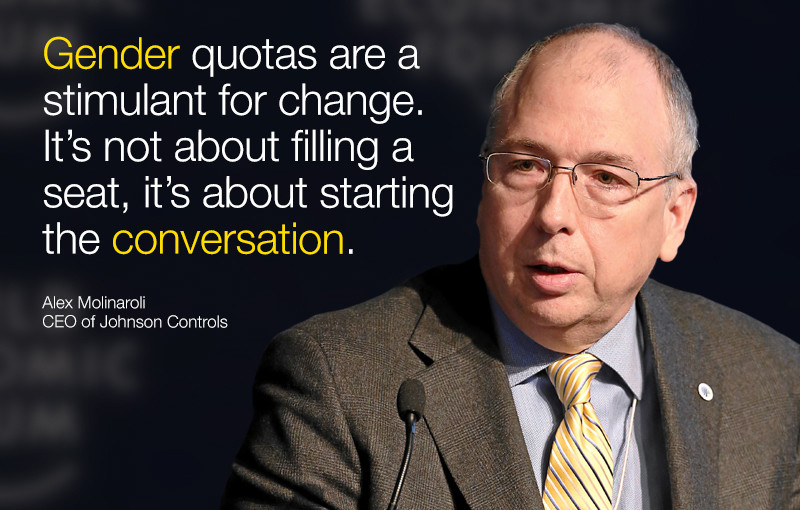Closing the gender gap in senior management

"To shatter the glass ceiling at the top, we need to build a better pipeline of female candidates in middle-manager positions"
Image: REUTERS/Paul Yeung
Stay up to date:
Gender Inequality
We are living in challenging times. With heightened terror alerts, natural disasters, global warming, cyber-attacks and political disorder, those of us at the World Economic Forum’s Annual Meeting have a large list of items to tackle this year.
But one issue of particular interest to me is gender parity. Not because of its deficit, but rather the opportunity it presents.
Although women make up one half of the world’s population, at this moment, only 22 women are serving as CEOs of Fortune 500 companies. The numbers don’t get much better when you move down the ladder, with women making up only 16.5% of positions just below CEO.

To shatter the glass ceiling at the top, we need to build a better pipeline of female candidates in middle-manager positions. This level allows for higher visibility and a better chance for sponsorship. It’s also at these levels that we can begin to develop women into future C-suite leaders by nominating them for community board positions, or enrolling them in executive leadership programs.
In order to address the pipeline issue at Johnson Controls, we incentivize leaders who meet gender targets. Although gender quotas are often perceived negatively by men and women alike, they’re a stimulant for change. It’s not about filling a seat, it’s about starting the conversation, bringing awareness and driving change. Without a realistic goal, there’s no accountability to make the change happen.
Taking control of gender parity
According to the 2016 Future of Jobs Report, supporting women in management has proven to be one of the most important levers for progress in achieving gender diversity in a corporate context. As CEO, it’s critical to embed gender diversity in our company’s culture.
That’s one of the reasons I became a Trustee of the World Economic Forum’s Global Challenge on Gender Parity. I hope my efforts help people think differently about the face of our global workforce and the growth opportunities it presents.
There are many things that are simply out of our control in this world. Gender parity doesn’t have to be one of them. If we want our businesses and economies to thrive, we need to close this gap in the workplace, and we need to do it fast.
Author: Alex Molinaroli is CEO of JCI. He is participating in the World Economic Forum’s Annual Meeting in Davos.
Don't miss any update on this topic
Create a free account and access your personalized content collection with our latest publications and analyses.
License and Republishing
World Economic Forum articles may be republished in accordance with the Creative Commons Attribution-NonCommercial-NoDerivatives 4.0 International Public License, and in accordance with our Terms of Use.
The views expressed in this article are those of the author alone and not the World Economic Forum.
Related topics:
Forum Stories newsletter
Bringing you weekly curated insights and analysis on the global issues that matter.
More on Forum InstitutionalSee all
World Economic Forum
May 16, 2025
Victoria Masterson, Stephen Hall and Madeleine North
March 25, 2025
Lorez Qehaja
March 19, 2025





